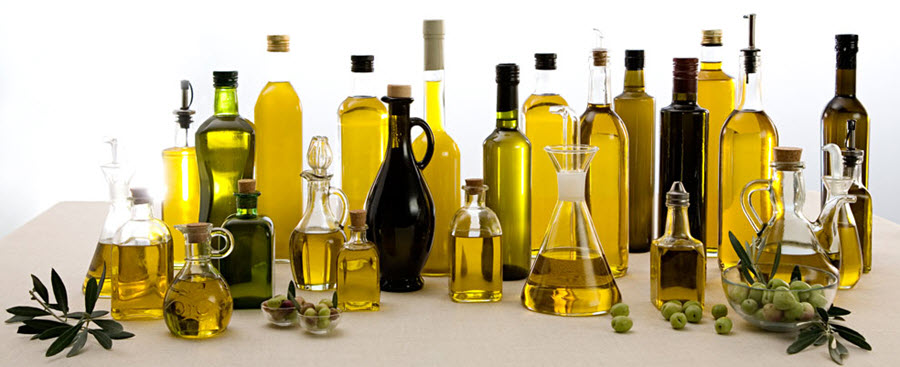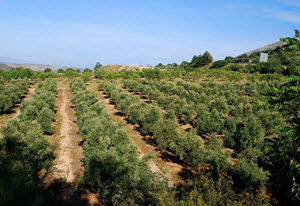
If a bottle of olive oil sold in the United States is labelled “Product of Spain”, that only signifies that it was packed and shipped from Spain. The olives can have grown and harvested anywhere in the world, and the process of extracting the oil and bottling it can also have been carried out somewhere else than in Spain.
If you want oil from a specific area of Spain, the Spanish Denominación de Origen certification can help you.
 Small producers of olive oil often proudly put their estate name on the bottle, letting you know not just what country or region the oil comes from but from exactly which estate it hails. An estate name printed on the label have therefore grown to be the mark of small-scale high-quality oils.
Small producers of olive oil often proudly put their estate name on the bottle, letting you know not just what country or region the oil comes from but from exactly which estate it hails. An estate name printed on the label have therefore grown to be the mark of small-scale high-quality oils.
Naturally, this fact is well-known within the olive oil industry and some producers of low-quality or just mediocre olive oil have started putting (real or made-up) estate names on their bottles to lure in customers and hopefully fetch a higher price for their products. Just using the presence of an estate name as your guide when selecting olive oil in the shop is therefore not advisable. We suggest you look up the estate name online and do some detective work to find out more, including reviews from other olive oil fans who have tried oils from that particular estate.
Exposure to light can damage the flavour of the olive oil. It is therefore best to buy dark-tinted bottles, unless the clear bottle comes in a box that has kept the oil in the dark. Another option is to buy olive oil in metal packaging.
Colour can vary widely even among very high-quality olive oils. It is therefore a good idea to stop listening to the people who proclaim that the greener the oil, the higher the quality. Olive oil colour can be impacted by many different factors, including olive variety used and at what point the olives were pressed.
Refined can be a tricky word to interpret correctly. We see refined printed on a bottle of olive oil and think it means that the oil is elegant, high class, etc. In reality, refined olive oil has been processed with solvents to mask off odours and flavours. It is a treatment that can be necessary when a producer starts with low-quality olives or blend several different low-quality olive oils together.
Olive oil is not meant for long-term storage. Ideally, it should be consumed within 2 years after being extracted from the olives. It is therefore best to buy bottles that have a date on the label, e.g. extraction date or a best-by date. If not, you might end up with a bottle that has been sitting on the shelf for a long time.
Compared to other classes of olive oil, Extra Virgin olive oils have undergone minimal processing and this typically means better flavour and aroma.
Many different stamps are employed to signal that a product was produced in an environmentally friendly way, but only some of these stamps are reputable and worthy of consumer trust.
In the United States, one of the stamps held in highest regard is the USDA organic seal, since it is controlled by the U.S. Department of Agriculture and can’t be used willy-nilly. Olive oils are only allowed to carry this seal if at least 95% of the oil is made in accordance with the USDA rules for organic production. This includes, among other things, rules about the use of pesticides and synthetic fertilizers.
N.B! Getting permission to use the USDA organic seal on a product is quite costly (you have to pay a fee to the USDA), and some small olive oil producers are therefore without this seal even though they sell a product that would be granted the seal if they applied for it.
Beware of olive oils scams. Regrettably, a lot of the olive oils sold world-wide doesn’t live up to what the label says. For instance, the amount of Extra Virgin olive oil produced annually isn’t nearly as large as the amount of olive oil marketed as Extra Virgin. As olive oil aficionados, it is therefore important to do our own tastings, find reputable producers and share our findings with each other. If you encounter something that seems to good to be true, such as Extra Virgin olive oil from Spain sold at an unusually low price, don’t fill your shopping cart until you have actually bought one bottle and tasted and smelled the oil yourself to see if it lives up to your requirements.
Reading tips: Journalist Tom Mueller’s book “Extra Virginity” published in 2011. In this book, we get to follow Mueller’s investigations of crime and adulteration in the olive oil business.